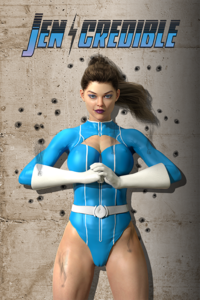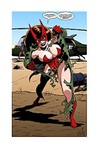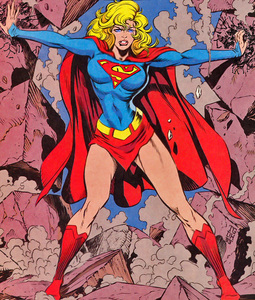- Posts: 449
- Thank you received: 966
- Forum
- Superwomen on screen and in print
- Superwomen on TV
- CBS / CW Supergirl TV Series
- Supergirl Season 3
- Season 3, Floriana Lima (Maggie) and Calista Flockhart (Cat) not to appear as regulars
Season 3, Floriana Lima (Maggie) and Calista Flockhart (Cat) not to appear as regulars
Just in case anyone hasn't spotted this yet...
It seems Floriana Lima has turned down the opportunity to return for Supergirl S3 in a regular capacity as Maggie Sawyer, one half of the 'Sanvers' ship that was highly popular with many Supergirl tv fans on social media. Lima has said she is leaving the show to pursue other roles, although reports are that she will still guest in a handful of S3 episodes.
And speaking of guesting in a handful of episodes... the producers have confirmed that Cat Grant will remain as an infrequent character throughout S3.
And on a vaguely related topic: I've managed to collate the S2 ratings. The charts below show the viewing figures, and the share of the audience in the key age demographic CW targets. Green is Arrow, red is The Flash, blue is Supergirl, and yellow is Legends of Tomorrow.
The Flash is CW's most rated cape show, with LoT and Arrow closely tied for least rated. In terms of the absolute ratings Supergirl started the season up close to The Flash, but dropped to midway between The Flash (top) and LoT/Arrow (bottom.) The key demographic share started the season midway between The Flash and LoT/Arrow, but dropped to almost the same level as the latter by the season's end. Overall Supergirl's ratings decline was slightly steeper than the other three shows, losing approximately one third of its audience across the season, but the ratings are still healthy for a CW show.
R5
This message has attachments images.
Please log in or register to see it.
Please Log in or Create an account to join the conversation.
- five_red
-
 Topic Author
Topic Author
- Offline
- Moderator
-

ElF
Please Log in or Create an account to join the conversation.
- lfan
-

- Offline
- Administrator
-

- Posts: 3913
- Thank you received: 2942
lfan wrote: I think its somewhat relevant to point out the "upward trend" in the last 4 episodes of the season seemed to coincide with the overall agreement with "better writing" towards the end of the season. Hopefully the trend will springboard into the next season!
ElF
I agree with Lfans statement.
Better writing brings in the viewers as word of mouth spreads.
Case in point.
I let Arrow fall off my "watch" list due to poor writing IMO.
Friends who still watch the show say i should check out the last handful of episodes as the writing has improved as this season progressed.
Now I am intrigued and plan to check it out.
Please Log in or Create an account to join the conversation.
- Markiehoe
-

- Offline
- Platinum Member
-

- Posts: 1995
- Thank you received: 1630
I say that because I believe that everyone who is good enough to get hired as a writer for a regular broadcast show has got to be capable of developing scenes and writing dialog, etc. They have skills.
But you don't just throw them in a room and see what comes out. There has to be a person or two who is defining the plots, characters, character interactions, etc. etc. and providing a basic (or detailed) outline to the writers to flesh out.
It can't be the Director running the show, as they have many different directors during the season. The only continuity they know is what someone tells them.
Does the Show Runner work out all the details of each show and scene? Seems too much given Berlanti has several shows.
Just wondering how all this works given we're all mostly agreeing that the writing varies a lot in quality, but that audiences seem to rise and fall with the quality of writing. Which makes it odd that writing can vary so much on the same show over time.
Can anyone explain the inner workings of the writing staff on a show like this?
Please Log in or Create an account to join the conversation.
- shadar
-

- Offline
- Uberposter par Excellence
-

- Posts: 3936
- Thank you received: 3635
www.imdb.com/title/tt2880448/
I also recommend "The Death of Superman Lives" to see a failed attempt at bringing a movie to production and to see how much money is thrown down a hole. I wonder where that money comes from?
www.imdb.com/title/tt2753778/
Please Log in or Create an account to join the conversation.
- Markiehoe
-

- Offline
- Platinum Member
-

- Posts: 1995
- Thank you received: 1630
shadar wrote: One thing I don't understand, and perhaps some of you can educate me, but how are writers on a show directed and managed?
There are different models, influenced by the type of production and local cultural influences.
British series, like Doctor Who, generally have a single producer (eg: Verity Lambert, Russell T Davis, etc. on Who) who will oversea the general direction of the show. If the producer is inexperienced, or the show is particularly demanding, there may well be one or more executive producers to liaise with the network. Under the producer is the script editor (eg: Douglas Adams, Elwen Rowlands, etc. on Who) who's job is to work with the writers, acting as a middle man between the writers and the show. The script editor's job is to come up with great stories for the show. They ensure that the scripts are delivered to deadline and the correct length, capable of being filmed within budget, faithful to the show's style and appropriate for its audience (eg: "F**k the Cybermen" is not acceptable dialogue), free from errors and conform to the show's canon (eg: Doctor Who can't fly, Daleks aren't actually robots, etc.), and meet the quality threshold remanded by the series. The script editor pushes the writers to try to get them to do better work, demanding rewrites (or even dropping a script) if necessary, while also defending the writer's vision to the producer if the writer wants to do something bold. Writers work from home, and are usually hired on a script-by-script basis because they were approached by the script editor with an offer of work, or because they pitched a story idea to the script editor that was picked up.
From what little I know of the the American model, I believe it commonly involves several producers, co-producers, executive producers, etc. in charge of the show and a staff of writers who sit together in an office and collaboratively come up with story ideas, which one or two of them will then write up as an actual script. The writers (as far as I know) usually answer directly to the producers, with the script editor taking up more of a logistics role of ensuring the scripts are delivered to deadline, fit within budget, and are the correct length. To what extent the script editor has the power to force a writer to do re-writes, or to reject an entire story idea, I don't know.
Of course I'm using the term 'British' and 'American' here as generalisations -- mere shorthand terms, for convenience -- these models aren't exclusively US or UK. There have been a handful of UK shows that used the US team model (the sitcom My Family being one of them), and plenty of US shows have rejected script teams in favour of individual writers.
It is also worth noting that these roles are fluid. Increasingly shows use a showrunner model (like the modern Doctor Who, for example), where the producer also acts as the show's chief writer, and (therefore) shares some of the duties regarding script quality control with the script editor.
I guess the 'British' model is more like the creative process for a novel, where the writer is central and the editor is just there to shape the writer's material to make it better and more suitable for the market. The 'American' model is a bit more like the old comicbook model, where the writers are just producing content to fill the pages, so the maximum amount of product that the market can accommodate can be shipped.
R5
Please Log in or Create an account to join the conversation.
- five_red
-
 Topic Author
Topic Author
- Offline
- Moderator
-

- Posts: 449
- Thank you received: 966
What only an insider would know is how much she's delegated to the writers to figure out, and how much she closely controls the scripts. If she was doing other projects or otherwise distracted (or just incompetent), that would explain why things can wander off and then get pulled back on track.
Given the audience seems to track the writing quality, you'd think this would be a top focus. Maybe Bertlani, Inc is spread too thin to run things properly.
My point is that blaming the writers might be overly simplistic. Blame Adler.
Shadar
five_red wrote:
shadar wrote: One thing I don't understand, and perhaps some of you can educate me, but how are writers on a show directed and managed?
There are different models, influenced by the type of production and local cultural influences.
British series, like Doctor Who, generally have a single producer (eg: Verity Lambert, Russell T Davis, etc. on Who) who will oversea the general direction of the show. If the producer is inexperienced, or the show is particularly demanding, there may well be one or more executive producers to liaise with the network. Under the producer is the script editor (eg: Douglas Adams, Elwen Rowlands, etc. on Who) who's job is to work with the writers, acting as a middle man between the writers and the show. The script editor's job is to come up with great stories for the show. They ensure that the scripts are delivered to deadline and the correct length, capable of being filmed within budget, faithful to the show's style and appropriate for its audience (eg: "F**k the Cybermen" is not acceptable dialogue), free from errors and conform to the show's canon (eg: Doctor Who can't fly, Daleks aren't actually robots, etc.), and meet the quality threshold remanded by the series. The script editor pushes the writers to try to get them to do better work, demanding rewrites (or even dropping a script) if necessary, while also defending the writer's vision to the producer if the writer wants to do something bold. Writers work from home, and are usually hired on a script-by-script basis because they were approached by the script editor with an offer of work, or because they pitched a story idea to the script editor that was picked up.
From what little I know of the the American model, I believe it commonly involves several producers, co-producers, executive producers, etc. in charge of the show and a staff of writers who sit together in an office and collaboratively come up with story ideas, which one or two of them will then write up as an actual script. The writers (as far as I know) usually answer directly to the producers, with the script editor taking up more of a logistics role of ensuring the scripts are delivered to deadline, fit within budget, and are the correct length. To what extent the script editor has the power to force a writer to do re-writes, or to reject an entire story idea, I don't know.
Of course I'm using the term 'British' and 'American' here as generalisations -- mere shorthand terms, for convenience -- these models aren't exclusively US or UK. There have been a handful of UK shows that used the US team model (the sitcom My Family being one of them), and plenty of US shows have rejected script teams in favour of individual writers.
It is also worth noting that these roles are fluid. Increasingly shows use a showrunner model (like the modern Doctor Who, for example), where the producer also acts as the show's chief writer, and (therefore) shares some of the duties regarding script quality control with the script editor.
I guess the 'British' model is more like the creative process for a novel, where the writer is central and the editor is just there to shape the writer's material to make it better and more suitable for the market. The 'American' model is a bit more like the old comicbook model, where the writers are just producing content to fill the pages, so the maximum amount of product that the market can accommodate can be shipped.
R5
Please Log in or Create an account to join the conversation.
- shadar
-

- Offline
- Uberposter par Excellence
-

- Posts: 3936
- Thank you received: 3635
ElF
Please Log in or Create an account to join the conversation.
- lfan
-

- Offline
- Administrator
-

- Posts: 3913
- Thank you received: 2942
lfan wrote: I hunk blaming Adler for the writing might be misguided, as I think her involvement with S2 appears to be far less than last season. While she has the title of EP, her absence at press junkets and promo events -- and even interviews -- makes me wonder. Andrew Kriesberg, this years show runner, is always quoted regarding casting and upcoming storylines so I think he might be more influential in the direction of he show.
ElF
Yeah, I don't think it is relevant to blame specific people. Both Adler and Kriesberg have responsibilities to other Berlanti shows, but before anyone points the finger it should be noted that the show I used as an example above -- Doctor Who -- is showrun by Steven Moffat, who is also producer on Sherlock. (Okay, okay, so maybe that was a lousy example, given that Who fans have apparently been complaining about Moffat's tenure on the show..! But I don't think it is the quality of the writing they're complaining about, more the general direction(?))
I think I said elsewhere on these forums at the end of Supergirl's first season that the show needed a good ol' fashioned script editor, in the classic UK sense. That comment was largely based on the disproportionately high number of glaring continuity gaffs between stories and fridge logic moments within stories, coupled with too many silly or illogical ideas that should have been quashed long before they made it to screen. I opted out of watching Supergirl's second season largely because the pre-S2 publicity seemed to promise a lot of gimmicks (Superman, crossovers-a-plenty, singing episodes, Lynda Carter) rather than solid storytelling; as such I simply can't comment on the quality of S2 from my own experience. I wasn't angry... I just realised that the show probably wasn't aimed at me despite my love of the Supergirl character. Rather than soldier on, possibly getting ever more frustrated, I decided to simply opt out.
I still watch other Berlanti cape shows, however -- I think one of their problems (in general) is that they're written a little like soap opera, with the continuing storylines seeming to drive the series, and the weekly plots layered on top of the ongoing drama. With other shows (again, at the risk sounding monotonous, Doctor Who is a good example) each story is a separate vision, often written in very different styles by different writers, into which the continuing storylines are blended.
It must also be noted that the production schedules for a series like Doctor Who and Supergirl are different. On Who scripts are commissions and developed months before they are filmed. Neil Gaiman's script was 18 months from initial script to screen (although that was an exception, as the script was held over for 12 months to use it in a later season.) This is to allow for scripts to be dropped, re-written, etc. Even noted screenwriter Richard Curtis (Blackadder, Four Weddings and a Funeral, Notting Hill, Bridget Jones's Diary...) was apparently told to do at least one major ground-up re-write when the showrunner/script editor didn't like his first draft story ideas. By contrast, on Supergirl the process seems to be mere weeks from script to screen. (The phrase "nevertheless, she persisted" didn't enter the common lexicon until February 2017, although admittedly the finale title could have been a late addition.)
R5
PS. Believe it or not, I don't actually watch Doctor Who either, btw! Just a good example for comparisons sake.
Please Log in or Create an account to join the conversation.
- five_red
-
 Topic Author
Topic Author
- Offline
- Moderator
-

- Posts: 449
- Thank you received: 966
It took two seasons for that show to shake out who was in charge and the show didn't get better until halfway into the third season.
I also find it a little surprising to R5 not watching season two at all.
To go from dissecting every episode seven ways to sunday to not watching at all is pretty jarring.
It's only 45 minutes total run time once a week.
Please Log in or Create an account to join the conversation.
- Markiehoe
-

- Offline
- Platinum Member
-

- Posts: 1995
- Thank you received: 1630
Markiehoe wrote: I also find it a little surprising to R5 not watching season two at all.
To go from dissecting every episode seven ways to sunday to not watching at all is pretty jarring.
It's only 45 minutes total run time once a week.
My reasoning has already been dealt with in a lengthy thread on this very forum almost twelve months ago. Suffice to say I think my love of the Supergirl character and a glass half full optimism carried me through the first season, despite becoming increasingly disillusioned with the show from Red Faced onward. I wasn't expecting the show to be exactly like the comics, and I was thrilled to find that the pilot episode had actually done an excellent job of setting up the series with an interesting world for Kara to inhabit. The pilot acting was first rate, the effects were good, and everything seemed to look very very promising for the upcoming series.
I think I became acutely aware of the writing problems with Red Faced, which saw Kara undergo a personality transplant from frame one. The cute, lovable, sincere Kara of episodes one to five instantly became this simmering mass of tension and anger -- without any foreshadowing in previous episodes. Before the episode aired pretty much everyone assumed the personality change must be due to Red Kryptonite; after the episode aired I realised it was due to inconsistent writing. It was as if the team who wrote episode six hadn't seen the first five episodes. Nobody had said to them: "hold on, you can't have Kara acting totally at odds with how she's behaved in previous episodes without either dropping clues in previous episodes or giving her a good excuse in this episode."
And from that point on I started to note lots and lots and lots of this kind of thing: characters who change their personality to fit the week's theme, stories premised on past events that never actually happened, and weak ideas that shouldn't have made it onto the screen. Although the acting was consistently great, it was the writing that let the show down. The show didn't seem to know what to do with certain characters -- Lucy was in the military, then joined CatCo, then joined the DEO, then rejoined the military, all in the space of 15 or so episodes. James and Winn never really seemed to live up to their team-Supergirl potential. Max Lord was set up as a major villain, then just became a minor nuisance who didn't really seem to have any clear aim or goal (other than not liking aliens.)
I was optimistic that these problems would be sorted out in season two, but then news started to filter through and it didn't look promising. Calista Flockhart's role was greatly reduced (she had been a highlight of season one), and then we started to find out about planned stories. Multi-episode crossovers. Superman. Lynda Carter. And (shudder!) an all-singing episode. What I wanted was for them to knuckle down and write some bloody compelling stories. I didn't expect them to win Emmy awards, but I expected them to write as if they thought they might. The news was suggesting gimmick after gimmick after gimmick.
At this point I'm being told "you must watch Stranger Things", "you must watch Westworld", "you must watch The Living and the Dead", etc. etc. by friends, and there's only so many tv-watching hours in the week. So I took a decision that Supergirl probably wasn't going to knuckle down and focus on delivering bloody compelling stories, and that the audience for the show was probably not me, and that rather than continue to watch the show and become bitter and angry about how it wasn't the show I wanted, I would be better off leaving it to whoever the intended audience is meant to be.
I don't regret the decision. Judging by social media, people who were serious Supergirl fans before the show started are the ones who seem to be most disappointed. The fans who didn't really have much of a relationship with Kara before the show are the ones who seem to be most enjoying the series. (I think one of the reasons why I've been able to stick with watching other Berlanti cape shows is because I don't have that same super-fan relationship. Although I have to admit I was going to drop S3 of the Flash until people here persuaded me the ending is worth it (don't post spoilers!!!) )
C'est la vie
R5
Please Log in or Create an account to join the conversation.
- five_red
-
 Topic Author
Topic Author
- Offline
- Moderator
-

- Posts: 449
- Thank you received: 966
I apologize if I brought back bad feelings.
I honestly missed your previous thread.
Please Log in or Create an account to join the conversation.
- Markiehoe
-

- Offline
- Platinum Member
-

- Posts: 1995
- Thank you received: 1630
- Forum
- Superwomen on screen and in print
- Superwomen on TV
- CBS / CW Supergirl TV Series
- Supergirl Season 3
- Season 3, Floriana Lima (Maggie) and Calista Flockhart (Cat) not to appear as regulars
